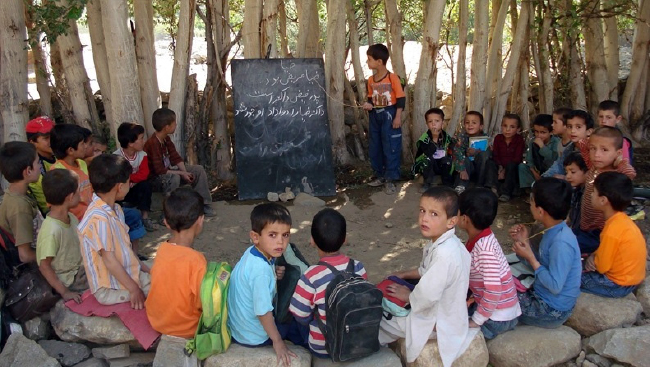Afghanistan’s educational system remains fragile after decades of war and violence. Militancy carried out by warring factions, mainly the Taliban guerilla fighters, will minimize educational opportunities. A large number of people are deprived of education for two main reasons: militancy and poverty. Afghan nation suffers severely from insurgency and the girls fear to attend schools in the Taliban-dominated areas.
It is self-explanatory that warring factions practice upon fundamental ideology which is against the females’ education. Their parochial mindset regarding women has been revealed during the Taliban’s regime. Women were deemed fit for the household chores and to labor in kitchen from dawn to dusk. They pursue the same mentality and pose threat to women who dare attend schools in the realm of their power. Men are also believed to be disturbed mentally while attending schools since the text books are not really desirable for the militant fighters.
One of the big challenges that the students express dissatisfaction about is the poor quality of the educational system. Although the text books have been standardized within the recent years, teachers and lecturers are not recruited based on their merit. In other words, the administrative corruption is a big obstacle before education and a large number of instructors are hired for two reasons: either paying bribe or the issue of nepotism. It is simply said that ‘blood is thicker than water’. Who will not prefer their family members to strangers while recruiting? It is a matter of great concern and must be taken seriously. In brief, people pay sacrifices not only due to war but also due to the nonstop cycle of corruption across the country. One will conclude that the executive power does not implement the law, as it is approved by the judiciary power, since many of the bribe-takers are at large rather than being behind bar.
Moreover, instructors are not paid dully and they can hardly make the ends meet. The insufficient payments to the teachers will pave the ground for bribery and law aversion. The needs of teachers are not taken into consideration. They spend their energy from morning to the evening but without sufficient payment. What would you do if you were one of them?
The teachers’ low-income will also result in lack of tendency towards education across the country. For instance, some go to school despite financial challenges to ensure a bright future for themselves and live a prosperous life. The question is that what if s/he becomes a teacher with low-income? Being in this dilemma, a number of teenagers and young students abandon schools and universities. One of the reasons behind the exodus and brain-drain is underestimating education in the country. Of course, when their dream for a bright future does not come true, they will be disappointed.
Decades of war have not only destroyed economic infrastructures but also closed the door to educational outcomes and our educated figures took refuge to foreign countries. Publication and educational and cultural activities ceased for many years, mainly during the Taliban’s regime. Suffering under the backbreaking difficulties of poverty, the energy and attention of the public were diverted from education to daily routine for getting bread and water so as to survive starvation. Although the challenges have been resolved to some extent, there are still people who wrestle with the same difficulties. In a nutshell, despite the dramatic increase in the number of schools in Afghanistan, many fall short, providing lackluster education in broken-down buildings, and undersupplied, overcrowded classrooms, teaching for only a few hours before the next shift of students arrives. Teachers are frequently unqualified. There is an unfortunate tendency for well-meaning organizations to build schools and move on, leaving the school’s fate in the hands of haphazard local administration and chance. Sadly, many investments in Afghanistan’s education are short-lived.
Considering the aforementioned facts, there are many obstacles before getting education and all of them are believed to be stemmed from years of war and violence. The warring parties still seek to hamper education through destabilizing the country and promising high income for the teenagers with the view to recruiting them. That is why many of the militant fighters are teenagers or just above it.
A strong education system that includes professional teachers and high-quality learning materials and methodologies is essential to Afghan economic growth, democratic development, and stability. Afghanistan has one of the youngest populations in the world, and should make quality education for rapidly growing numbers of school-aged boys and girls a top national priority.
Home » Opinion » Obstacles before Getting Education
Obstacles before Getting Education
| Hujjatullah Zia

